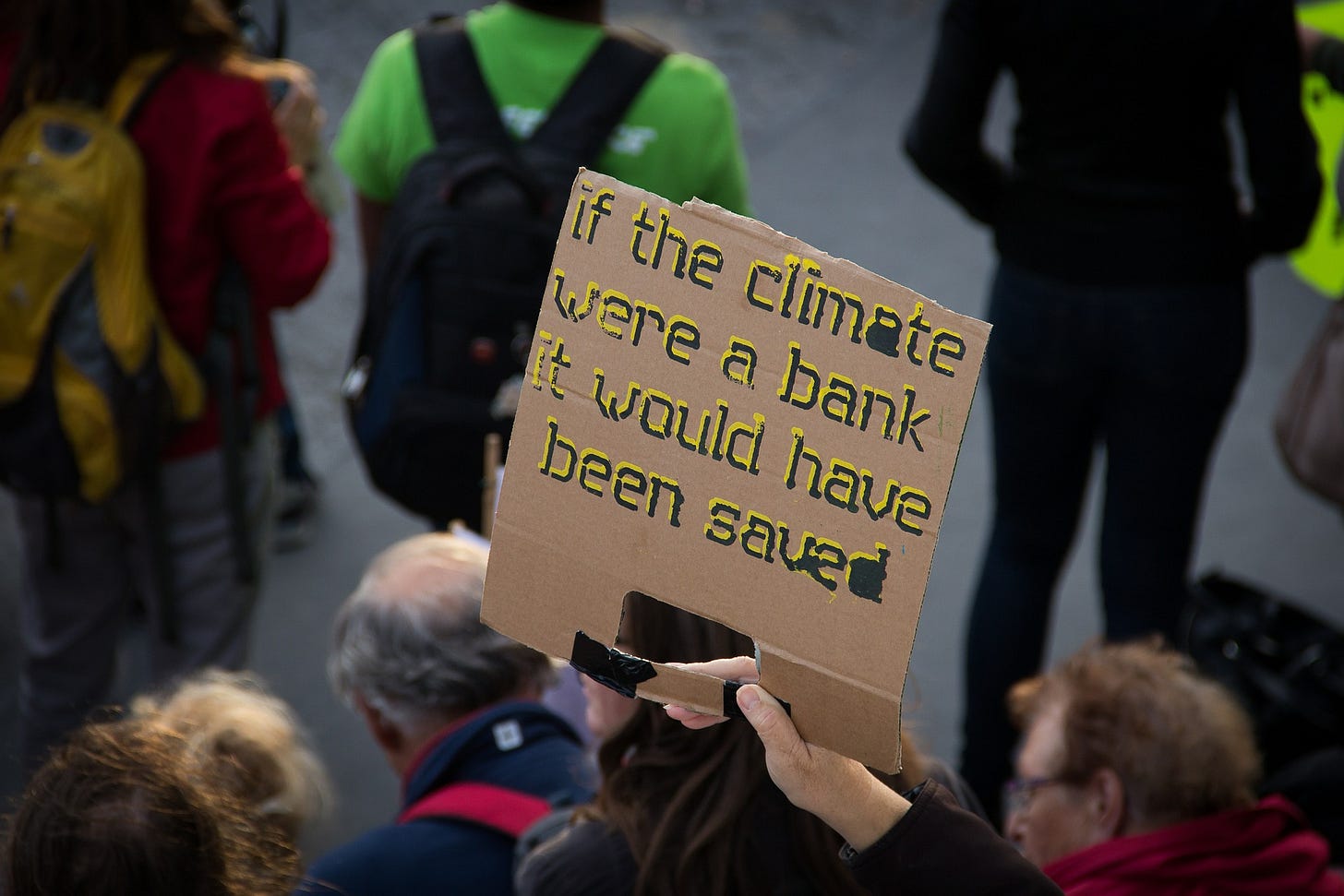It’s a fair question: How do we think Bank of Nature can be a voice for nature?
The temerity! The hubris! The obscenity of equating nature with business! The complete lack of awareness of our historical colonial travesty that doubles down on that dominant white European supremacy model that subjugates humans and nonhumans alike!
How dare us.
If “Proxy for Nature” had a job description, we might not actually qualify — but we’d gamely apply, understanding that, first, the hiring committee would have to know who HR wants in the job. If “Proxy for Nature” were an entity with agency and rights and financial wherewithal, we might not know how to spend in order to “Make More Nature” — but a fully funded planet-scale nature boost intended to repair nature does make for some creative science-based transdisciplinary conversations.
“What can we do first?” is a better question than “What can we do?”
Hold your nose if you must, but the difference is money wielded by something like the Climate Science Department, and its team of scale-thinking science makers, at Bank of Nature.

I mean, how many climate remedies are undone because of a lack of funding? Grants need outcomes. VCs need interest-loaded exit strategies. If shareholder value is threatened, a climate fix is nixed — even the one that has the potential to save us from this climate threat.
That, I would argue, is hubris.
How dare finance stand in the way of any effort to fix our climate crisis that can’t first prove that it will make good business?
As contrast: The Space Race didn’t need a financial return on investment for the US to spend $30 billion (in 1950s and ‘60s greenbacks) to get to the moon. They just did it and advances in sectors like robots, computing, solar and telecommunications followed.
Climate doesn’t enjoy the same sense of audacious adventure — because 1) the climate crisis crosses national borders and doesn’t fit well with Cold War-style nation state competition, 2) today’s corporatized government is likely unrecognizable to then-US president Kennedy who just ordered Congress to marshal the funds in 1961 and 3) climate fixing is in every sense a threat to our global growth economy priorities that puts no stock in long-horizon strategies.
This is why we argue for a proxy for nature that is a peer for industry and government.
Today, among the academy, there are scholars whose jobs are to parse the many ways that the current system has failed us — documented, in summary, as a complex web of social theories and data sets that suggest what we already know: Society is about industry and that has a vastly unjust, destabilizing human and environmental costs.
The scholars' concerns about Bank of Nature are that it emanates from a system of historical, colonial oppression.
Again, it's a fair comment. Many climate critics contend instead that we should innovate a cultural solution to the climate crisis — that there are ways to think about justice that will make the difference at scale. How? They grapple with that question too without the access to funding able to execute a planet-scale.
Our critics worry, with legitimate concern, that using the language of systems that caused injustice can’t be converted into tools for justice. We disagree, but let's follow the thought.
With 70 years of climate science warnings and the tallied social toll of global industry, people are still marginalized. Cultures are still swamped by a western-European colonial bias and arrogance and militarism. Non-human biology is still shrinking by the day because of the viral spread of human exceptionalism powered by very old and tired white male supremacy tyranny and its avaricious accumulation of power in a few hands.
How dare Bank of Nature use a colonial white male supremacy model — banking and currency — to deal with a crisis created by a colonial white male supremacy model — banking and currency.
So academically we negate the old system, the one with the power and momentum, for something more about equity and justice that has zero rocks to throw at Goliath.
Where this lands us, to be blunt, is in small, iterative, social movements that have done little to change the plight of marginalized humans, vanishing culture and biology or a blighted environment. To rely on a human awakening of conscience is too risky for me.
Down the hall from the Climate Science Department at Bank of Nature is the Climate Justice Department and its team of culture, history, justice and diversity experts with the funding to implement cultural remedies at scale. Again, hold your nose, but the difference between theory and execution is money — money for the program and money for the people working in the program who, themselves, have expenses like housing and children and food.
The issue is scale. That Bank of Nature dares to speak for Nature is a declaration of scale — and that does not exist yet in climate science or climate justice. It exists in global finance.
There are more in other writings, but Bank of Nature is about using the system that does exist at scale to make the fixes at scale. Pension funds, as a prime target, have the size, the funding, the mission and the duty to be the "heroes of climate security." Bank of Nature gives them a focal point to point big money at climate in ways that don't yet provide the carrots and sticks to do so.
The truth is that no one yet speaks for nature in a way that respects nature's investment in human evolution and society making, however just or unjust, malevolent or benevolent, hubristic or modest. Nature needs agency and, with agency, nature and culture and human dignity have recourse.




Let's talk about the Bank of Nature campus, with its facilities for a Climate Action Department that includes a Climate Science Department and a Climate Justice Department!